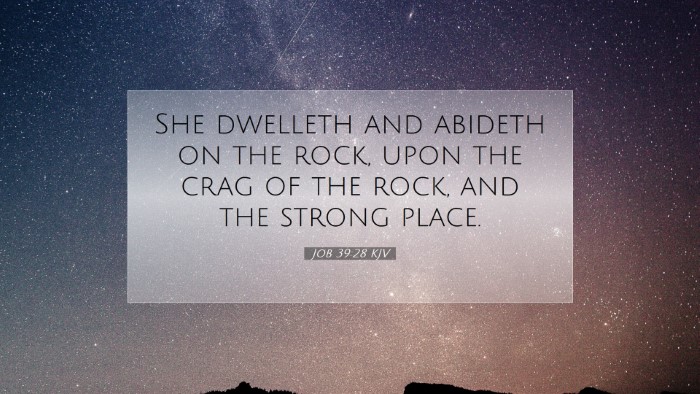Old Testament
Genesis Exodus Leviticus Numbers Deuteronomy Joshua Judges Ruth 1 Samuel 2 Samuel 1 Kings 2 Kings 1 Chronicles 2 Chronicles Ezra Nehemiah Esther Job Psalms Proverbs Ecclesiastes Song of Solomon Isaiah Jeremiah Lamentations Ezekiel Daniel Hosea Joel Amos Obadiah Jonah Micah Nahum Habakkuk Zephaniah Haggai Zechariah MalachiJob 39:28
Job 39:28 KJV
She dwelleth and abideth on the rock, upon the crag of the rock, and the strong place.
Job 39:28 Bible Commentary
Commentary on Job 39:28
Verse: "The stork in the heaven knoweth her appointed times; and the turtle and the crane and the swallow observe the time of their coming." (Job 39:28)
Introduction
The verse under consideration is a part of God’s discourse with Job, highlighting the wisdom and awareness of creation, particularly in reference to instinctual knowledge inherent in animals. This commentary synthesizes insights from several esteemed public domain sources, primarily focusing on the nature of God's created order and the lessons it imparts to humanity.
Contextual Framework
The Book of Job is a profound examination of suffering, divine justice, and human understanding. In chapters 38 through 41, God speaks to Job, asserting His sovereignty and the intricacy of His creation. Job 39 catalogues various creatures, pointing to their behaviors as evidence of God’s wisdom.
Verse Analysis
Stork
Matthew Henry emphasizes the stork as an emblem of loyalty and that it knows its appointed times. The stork migrates seasonally and returns to its families, symbolizing a divine order recognized even by creatures seemingly lesser than man.
Turtle and Crane
According to Albert Barnes, the turtle (often interpreted as the turtledove) and crane demonstrate a similar instinct to observe seasonal changes. Their migratory patterns serve as a reminder to humanity about the importance of timeliness and the natural rhythms established by God.
Swallow
Adam Clarke notes the swallow as a bird known for its swift return every spring. This behavior highlights a divine orchestration in nature that is consistent and reliable, pointing to God's providential care over creation.
Theological Implications
The behavior of these birds suggests that even in the animal kingdom, there exists a profound sense of timing and order. This notion can be contrasted with human folly, as men often fail to recognize the times and seasons ordained by God.
Divine Order and Instinct
This verse serves as a reminder that God's creation, including animals, often adheres to the divine order. Matthew Henry articulates that while animals act on instinct, humans are endowed with reason yet regularly stray from the divine paths intended for them.
Lessons for Humanity
- Acknowledgment of God’s Sovereignty: There is a call for humanity to acknowledge the divine sovereignty that governs life. Just as animals follow their instinctive paths established by God, humans are urged to recognize and follow divine guidance.
- Seasonality of Life: The appointed times signify that life has seasons, and understanding this can lead to spiritual wisdom. Just as the stork, turtle, crane, and swallow know their times, believers are encouraged to discern God’s timing in their own lives.
- Call to Observe: Just as these creatures observe the signs of their seasons, Christians are called to be observant of the world around them and to glean wisdom from God’s creation.
Concluding Reflection
Job 39:28 encapsulates a major theological theme of the book: the understanding of God's creation and order in contrast to the human experience of suffering and doubt. By observing the natural world, believers can gain valuable insights into God's character and intention.
In summary, this verse not only illustrates the timely instincts of nature's creatures but also challenges humanity to align itself with the divine will. It invites pastors, theologians, and students alike to reflect deeply on the wisdom evidenced in creation, leading to a greater understanding of the Creator's purpose and the careful stewardship of His wonders.


